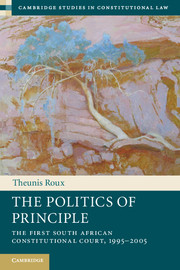Book contents
- Frontmatter
- Contents
- Acknowledgements
- Introduction
- Part I Problematic, Theory, Methodology
- 1 The Chaskalson Court's achievement
- 2 A conceptual framework for assessing the performance of constitutional courts
- 3 Operationalising the conceptual framework to explain the Court’s achievement
- Part II Context
- Part III Thematic Case Studies
- Conclusion
- Bibliography
- Index
- References
1 - The Chaskalson Court's achievement
Published online by Cambridge University Press: 05 April 2013
- Frontmatter
- Contents
- Acknowledgements
- Introduction
- Part I Problematic, Theory, Methodology
- 1 The Chaskalson Court's achievement
- 2 A conceptual framework for assessing the performance of constitutional courts
- 3 Operationalising the conceptual framework to explain the Court’s achievement
- Part II Context
- Part III Thematic Case Studies
- Conclusion
- Bibliography
- Index
- References
Summary
There is something quite intriguing, the Introduction to this study has argued, about the way the Chaskalson Court responded to its mandate under the post-apartheid Constitutions. Not only did the Court build a strong legal-professional reputation. It was also remarkably effective in asserting its institutional role in South African politics. Explaining this achievement requires a particular kind of interdisciplinary study, one that synthesises the conceptual frameworks and methods of judicial politics and liberal legal theory.
The purpose of this chapter is to examine this claim more closely: to clarify the nature of the Court's success in legal and political terms and to show why its achievement might be best explained by means of an interdisciplinary study of the sort proposed. To do this, we will need to give a positive answer to three questions: (1) Do judicial politics scholars and liberal legal theorists really conceive of the success of constitutional courts in significantly different terms? (2) If they do, was the Chaskalson Court indeed successful according to the criteria applied by each field? (3) If it was, is there something about this combined achievement that neither field on its own can adequately explain?
- Type
- Chapter
- Information
- The Politics of PrincipleThe First South African Constitutional Court, 1995–2005, pp. 15 - 71Publisher: Cambridge University PressPrint publication year: 2013

